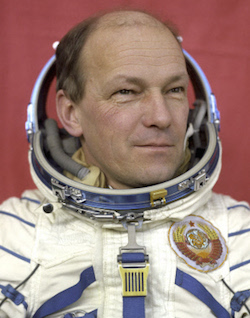Nikolai Rukavishnikov facts for kids
Quick facts for kids
Nikolai Rukavishnikov
|
|
|---|---|
 |
|
| Born | September 18, 1932 |
| Died | 19 October 2002 (aged 70) Moscow, Russia
|
| Nationality | Soviet |
| Occupation | Physicist |
| Awards | Hero of the Soviet Union (twice) |
| Space career | |
| Cosmonaut | |
|
Time in space
|
9d 21h 09m |
| Selection | Civilian Specialist Group 2 |
| Missions | Soyuz 10, Soyuz 16, Soyuz 33 |
|
Mission insignia
|
|
Nikolai Nikolayevich Rukavishnikov (born September 18, 1932 – died October 19, 2002) was a brave Soviet cosmonaut. A cosmonaut is like an astronaut, someone who travels to space! He flew on three important space missions called Soyuz 10, Soyuz 16, and Soyuz 33. On two of these flights, Soyuz 10 and Soyuz 33, his spacecraft tried to connect with Salyut space stations. However, they were not able to dock successfully.
Contents
About Nikolai Rukavishnikov
Nikolai Rukavishnikov was born in Tomsk, USSR. He was a very smart person who loved science. He studied at the Moscow Engineering and Physics Institute. After finishing his studies, he started working for a famous space design company.
In 1967, Nikolai was chosen to train as a cosmonaut. This was a very special and exciting opportunity!
First Space Journey: Soyuz 10
Nikolai became the 50th person ever to fly in space. This happened on April 23, 1971. He was part of the Soyuz 10 mission with two other cosmonauts, Vladimir Shatalov and Aleksei Yeliseyev.
Their main goal was to connect their spacecraft with the Salyut 1 space station. This would have been a big step for space travel! Unfortunately, they could not connect properly. After two days in space, they safely returned to Earth.
Testing New Spacecraft: Soyuz 16
Nikolai's second trip to space was on December 2, 1974. This time, he flew on Soyuz 16 with Anatoly Filipchenko. This mission was very important. It was a test flight for new equipment that would be used in a special project.
This project was called the Apollo–Soyuz Test Project. It was a mission where American and Soviet spacecraft would meet in space. The Soyuz 16 mission lasted six days and was a complete success! They proved the new equipment worked well.
Challenging Mission: Soyuz 33
Nikolai's third and final space flight was on April 10, 1979. He flew on Soyuz 33 with Georgi Ivanov, a cosmonaut from Bulgaria. This was an Intercosmos flight, meaning it involved cooperation with other countries.
Their mission was to dock with the Salyut 6 space station. As they got close, something went wrong. The spacecraft's main engine stopped working! Because of this, they had to stop their docking attempt.
They used a backup engine to return to Earth. The journey back was a bit rough, with a strong pull of gravity. But Nikolai and Georgi landed safely.
Life After Space Missions
Nikolai Rukavishnikov left the space program in 1987. He went back to work for the same company where he started, which was then called Energia. He continued to contribute to space efforts from the ground.
Nikolai passed away on October 19, 2002, from a heart attack.
Awards and Honors
Nikolai Rukavishnikov received many special awards for his bravery and contributions to space exploration:
- He was named Hero of the Soviet Union two times. This is a very high honor!
- He earned the title Pilot-Cosmonaut of the USSR.
- He received four Orders of Lenin.
- He was also honored by other countries, including being named Hero of the Mongolian People's Republic and Hero of the People's Republic of Bulgaria.
- He received the Order of Sukhbaatar from Mongolia and the Order of Georgi Dimitrov from Bulgaria.
See also
 In Spanish: Nikolái Rukavishnikov para niños
In Spanish: Nikolái Rukavishnikov para niños
 | George Robert Carruthers |
 | Patricia Bath |
 | Jan Ernst Matzeliger |
 | Alexander Miles |

